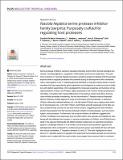| dc.contributor.author | De Marco Verissimo, Carolina | |
| dc.contributor.author | Jewhurst, Heather L. | |
| dc.contributor.author | Tikhonova, Irina G. | |
| dc.contributor.author | Urbanus, Rolf T. | |
| dc.contributor.author | Maule, Aaron G. | |
| dc.contributor.author | Dalton, John P. | |
| dc.contributor.author | Cwiklinski, Krystyna | |
| dc.date.accessioned | 2020-09-24T13:41:50Z | |
| dc.date.available | 2020-09-24T13:41:50Z | |
| dc.date.issued | 2020-08-06 | |
| dc.identifier.citation | De Marco Verissimo, Carolina, Jewhurst, Heather L., Tikhonova, Irina G., Urbanus, Rolf T., Maule, Aaron G., Dalton, John P., & Cwiklinski, Krystyna. (2020). Fasciola hepatica serine protease inhibitor family (serpins): Purposely crafted for regulating host proteases. PLOS Neglected Tropical Diseases, 14(8), e0008510. doi:10.1371/journal.pntd.0008510 | en_IE |
| dc.identifier.issn | 1935-2735 | |
| dc.identifier.uri | http://hdl.handle.net/10379/16185 | |
| dc.description.abstract | Serine protease inhibitors (serpins) regulate proteolytic events within diverse biological processes, including digestion, coagulation, inflammation and immune responses. The presence of serpins in Fasciola hepatica excretory-secretory products indicates that the parasite exploits these to regulate proteases encountered during its development within vertebrate hosts. Interrogation of the F. hepatica genome identified a multi-gene serpin family of seven members that has expanded by gene duplication and divergence to create an array of inhibitors with distinct specificities. We investigated the molecular properties and functions of two representatives, FhSrp1 and FhSrp2, highly expressed in the invasive newly excysted juvenile (NEJ). Consistent with marked differences in the reactive centre loop (RCL) that executes inhibitor-protease complexing, the two recombinant F. hepatica serpins displayed distinct inhibitory profiles against an array of mammalian serine proteases. In particular, rFhSrp1 efficiently inhibited kallikrein (Ki = 40 nM) whilst rFhSrp2 was a highly potent inhibitor of chymotrypsin (Ki = 0.07 nM). FhSrp1 and FhSrp2 are both expressed on the NEJ surface, predominantly around the oral and ventral suckers, suggesting that these inhibitors protect the parasites from the harmful proteolytic effects of host proteases, such as chymotrypsin, during invasion. Furthermore, the unusual inhibition of kallikrein suggests that rFhSrp1 modulates host responses such as inflammation and vascular permeability by interfering with the kallikrein-kinin system. A vaccine combination of rFhSrp1 and rFhSrp2 formulated in the adjuvant Montanide ISA 206VG elicited modest but non-significant protection against a challenge infection in a rat model, but did induce some protection against liver pathogenesis when compared to a control group and a group vaccinated with two well-studied vaccine candidates, F. hepatica cathepsin L2 and L3. This work highlights the importance of F. hepatica serpins to regulate host responses that enables parasite survival during infection and, coupled with the vaccine data, encourages future vaccine trials in ruminants. | en_IE |
| dc.description.sponsorship | This study was funded by the Science Foundation Ireland (SFI, Republic of Ireland)-Department of Education and Learning (DEL, Northern Ireland) grant 14/IA/2304 and Science Foundation Ireland (SFI, Republic of Ireland) grant 17/RP/5368. The funders had no role in study design, data collection and analysis, decision to publish, or preparation of the manuscript. | en_IE |
| dc.format | application/pdf | en_IE |
| dc.language.iso | en | en_IE |
| dc.publisher | Public Library of Science | en_IE |
| dc.relation.ispartof | Plos Neglected Tropical Diseases | en |
| dc.rights | Attribution-NonCommercial-NoDerivs 3.0 Ireland | |
| dc.rights.uri | https://creativecommons.org/licenses/by-nc-nd/3.0/ie/ | |
| dc.subject | Fasciola hepatica | en_IE |
| dc.subject | serine protease inhibitor family (serpins) | en_IE |
| dc.subject | regulating host proteases | en_IE |
| dc.title | Fasciola hepatica serine protease inhibitor family (serpins): Purposely crafted for regulating host proteases | en_IE |
| dc.type | Article | en_IE |
| dc.date.updated | 2020-09-24T10:47:22Z | |
| dc.identifier.doi | 10.1371/journal.pntd.0008510 | |
| dc.local.publishedsource | https://doi.org/10.1371/journal.pntd.0008510 | en_IE |
| dc.description.peer-reviewed | peer-reviewed | |
| dc.contributor.funder | Science Foundation Ireland | en_IE |
| dc.contributor.funder | Department of Education and Learning, Northern Ireland | en_IE |
| dc.internal.rssid | 22800945 | |
| dc.local.contact | John Pius Dalton. Email: johnpius.dalton@nuigalway.ie | |
| dc.local.copyrightchecked | Yes | |
| dcterms.project | info:eu-repo/grantAgreement/SFI/SFI Investigator Programme/14/IA/2304/IE/Application of New and Emerging Technologies to Develop Vaccines against Fasciola hepatica/ | en_IE |
| nui.item.downloads | 98 | |


